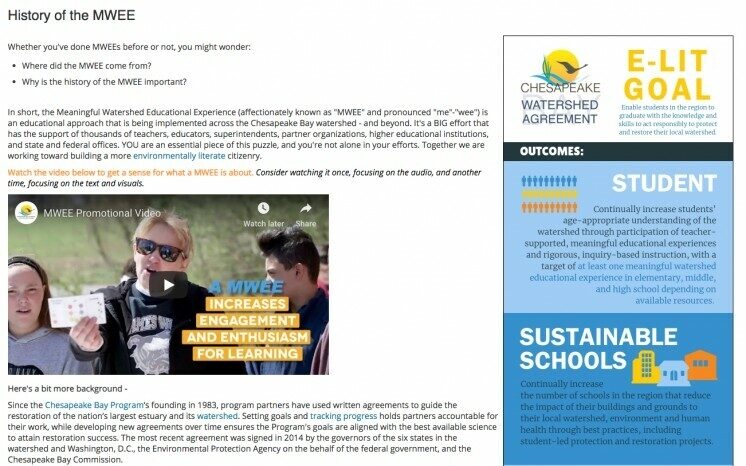MWEE 101 Online Course Launch!

Partners from the Chesapeake Bay Program Education Workgroup are excited to announce the launch of an online course created to provide in-depth understanding of the Meaningful Watershed Educational Experience for both formal and non-formal educators. MWEE 101, as the course is known, is housed on NOAA’s learning management system Chesapeake Exploration. The course is a free resource that is based on An Educator’s Guide to the Meaningful Watershed Educational Experience and comprises three lessons: Why MWEEs? What Makes a MWEE? and Planning and Evaluating MWEEs. Throughout the course participants will gain an extensive understanding of the essential elements and supporting practices by following a series of case study videos and by looking at examples of completed planning and implementation tools including the Environmental Literacy Model (ELM).
This course may be used to support professional development in a number of ways: First, as a stand-alone resource for educators to reference as they learn about and build MWEEs. Since the course is free, educators can count on the MWEE 101 course as a resource to pull examples from. In the coming months the this course will be offered for continuing education credits in Maryland, Virginia, Pennsylvania, and Delaware. By offering this online course we hope to make MWEE training more accessible across the entire Chesapeake Bay Watershed, and beyond! This course may also be used to support in-person professional development by providing information to participants before, during, and after workshops. This model will allow for more time during in-person trainings to be spent on modeling best practices for outdoor field experiences and working with educators to plan their MWEEs. If you are interested in embedding this course into your professional development workshop contact elise.trelegan@noaa.gov for more details.
So what’s next? Later in 2019, the workgroup will be rolling out a series of state-specific modules that build on the MWEE 101 course to engage participants in actually planning and implementing their MWEE while considering more specifics like state standards, relevant environmental issues and phenomena, and local partners and resources. In the future, the workgroup also hopes to create a module for administrators and non-formal organizations to explore how the MWEE can be embedded systemically in support of the Chesapeake Bay Program’s Environmental Literacy Goal.
Ready to check out the MWEE 101 course? Check it out today: http://bit.ly/MWEECourse
